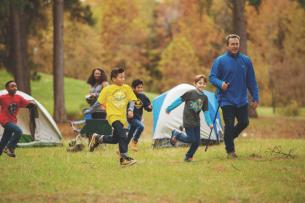 Camping is a great way to have exciting outdoor adventures, learn to cook outdoors, and learn to be a good citizen in our natural environment!
Camping is a great way to have exciting outdoor adventures, learn to cook outdoors, and learn to be a good citizen in our natural environment!
 When do the camp-outs happen? Pack 478 has two pack-wide camp-outs every year: one in the spring and one in the fall. More information about the camp-outs will be available through your den leaders or at the Pack meetings.
When do the camp-outs happen? Pack 478 has two pack-wide camp-outs every year: one in the spring and one in the fall. More information about the camp-outs will be available through your den leaders or at the Pack meetings.
Where do we camp? Some of the campgrounds where we have camped include Little Bennett, Greenbrier and Cunningham Falls.
Who can come along to camp? This is a very popular activity for the Pack, and the whole family is invited! All skill levels are welcome. You are required to bring your own gear, but feel free to contact your den leader for advice if you are new to camping.
What activities are there at the camp-outs? Pack 478 camp-outs typically begin with site set-up and den activities on Saturday afternoon. Each den is responsible for cooking dinner for itself as a group. After dinner, all of the dens converge to a campfire circle for Pack-wide skits and songs by the fire. Each den presents a skit for the whole Pack to enjoy. On Sunday morning, the den is once again responsible for cooking breakfast as a group, and shortly thereafter the pack reconvenes once more for a hike.
What should we bring to the camp-outs? Here is a helpful checklist of common items to bring. It is not exhaustive, but it's a good place to start.
- Tent
- Sleeping pads/mattresses
- Sleeping bags and/or blankets. In chilly weather, the best way to keep warm is to provide insulation under and on top of each sleeping person. Sometimes an extra blanket or towel underneath you, to insulate you better from the ground, is more important than one on top.
- Pillows
- Flashlights: at least one per family, perhaps one per person. Important for safely walking around at night, back to campsite from campfire, late night bathroom breaks, etc.
- Bug repellent
- Sunscreen
- Rain coat or poncho
- One towel per person for washing
- Toiletries/Medications
- Folding/portable chair(s)
- Personal-size refillable water bottle, one per person. Physical activity plus campfire is dehydrating. Plus, important for hiking on Sunday.
- CLOTHING: In addition to the obvious "bring something to wear on Sunday", you'll want to consider:
- Layers: the best way to adjust to warm days/cool nights is to add/subtract a t-shirt, long sleeve shirt, sweatshirt or sweater, and perhaps a light shell or windbreaker. You don't want to get cold, but also don't want to be too hot. This way you can dress up or down as temperatures change.
- SOCKS: bring extra socks. Sweaty socks are cold. If you're going to wear socks to sleep in, for example, change into clean, dry socks just before bedtime. Your toes will thank you. Bring at least one more pair of socks than you would otherwise.
- Sleeping: Again, layers are good. In this case, you want to trap air against your body to stay warm. If you don't have super warm pajamas available, sweatpants, sweatshirt, and socks work great, especially with a tee shirt and long summer-weight pajama pants underneath. Bring crocs or slippers to put on in case of late-night urges.
- Hands: You have three ways to keep your hands warm at night/early morning: gloves, warm pockets, and standing by campfires.
- Hat or hooded sweatshirt: a bare head sheds a lot of body warmth, and a covered head goes a long way to keeping you comfortable.
